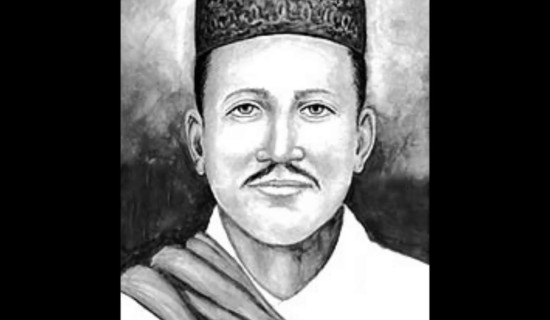- Saturday, 23 August 2025
Identity Amidst Conformism
Noted Hollywood film producer, director and actor, among other profiles, Clint Eastwood, 95, is in the director’s chair for an upcoming film. On his vast energy and artistic creativity, the veteran cine-figure with an array of genre-defining fares, says he “will work as long as I can. There’s no reason why a man can’t get better with age. And I have much more experience today”.
For many, retirement is no longer chasing a past career. On other fronts, many people seek to reject the system of social approval for personal habits and choices. They are not for an identity, whether others endorse or reject the same. Making the most out of the new conditioning should make the passage toward a riper life easier, more convenient and, most importantly, practical to the core. Whatever one engages in might require dignified adjustments.
To a voracious reader, communication navigator and regular penpusher like this scribe, the present matters a lot — reading what the rush of a more routine, salaried life did not allow and had to skip the whole gamut of written works, appreciated as “must read”. Millions in advanced economies look forward to a retired life in anticipation of leisure, pleasure and doing things one did not have the time to undertake during the prime of “busy bee” innings.
Used to predetermined schedules, with occasional diversions like outings and holidaying away from the paid work station, the sudden surplus-carrying timeframe baffles many people. Time does not freeze. Its linear march goes on for eternity, come what may, to the vagaries of nature and life on Earth.
Choices under pressure
Is the meaning of life to be interpreted as essentially what others recommend? Does it help you find yourself? Or does the pressure herd you with the rest? That would be like eating into the potential identity one could explore and adopt, even if eyebrows are stretched high. Social units dish out pressures. The smallest but perhaps the closest tier of them, the family and immediate close circle, too, might find your stance “odd”, perhaps “embarrassing” or even “humiliating”.
Standardisation of social norms and demeanour deprives an individual of developing personal identity, while society at times cuts short the prospects of new ideas and initiatives being discussed and examined. A rule book is essential for not making people unwieldy. Unruly behaviour can be a problem. But I see no reason why an individual cannot go his own way as long as it does not hurt others.
Examining the results of actions and inactions provides lessons to embrace or reject. It stimulates more curiosity that might prompt an individual to pursue it for a greater length of time to share the results with others. Power attracts conformism, docility, awe and the like: the boss is always right and the subordinate is not expected to question much but to follow obediently. Conformity is easy, questioning might be termed troublesome, while frequent questioning could be construed as dangerous. Its numbing effects kill curiosity, follow-up with experiments and demonstrate the outcome to peers.
Now, into the early 70s, my basic routine has hardly changed from the past half century. No longer having to trek to a regular workplace, I am overwhelmed by the opportunity to read and read, and do some writing. My only regret is not being able to give much time to people keen on meeting and sharing views on current events, or going through their manuscripts and books.
Learning is a lifelong process. It never ends for those in the pursuit of knowledge and the search for answers to their curiosity. An honest review of one’s own life and the works of others provides satisfaction. If one can afford the “luxury” of expressing one’s critical thoughts out in the open and at noted public platforms, it liberates the mind no end. A post-hierarchical life in work workplace can be enjoyable. Cultivating free thinking and sharing their conclusions with society might be a world apart from what most individuals are used to all their lives. Social units like family and close circles have a remnant of hierarchy but those can be dispensed with to a large extent.
Some individuals think on their own and sift something what others say; some dwell exclusively on what others say; and the remaining majority take a roller-coaster ride to lift without pause whatever others say without bothering to analyse the content. If there is enjoyment in it, especially at an elderly age, that should be alright as long as it does not treat others unfairly.
Honesty soothes
The vicissitudes of life and career, and social connectivity are influenced by how one observes, scribbles and narrates for communication. A recluse might shun socialisation or surrender to changed circumstances, clamped by age, health and a feeling of irrelevance in community life. Life goes on. The important thing is to do what satisfies an individual the most, the prompter being love for enjoying life, whatever the vagaries of the times and the shape and form of the physique.
Fear of provoking the label of a has-been can frustrate people who wish to assert being relevant with ideas. The potential to contribute without attracting strains on the physique and mind might offer a satisfying sense of being of service, which should stand in good stead. Constant curiosity keeps the brain engaged and sharp, enabling an individual to age with grace and manageable activity rather than resignation. Adjusting to a new reality for drawing the best without ill intention should ease things—and perhaps even more.
Someone honest with himself and others dispenses with pretences by not endorsing or nodding at things not personally approved of, whereas silence might be an overstretched but weak compromise. Do what one is best at. By the time we come to the ride of the funeral pyre, what we leave behind is a space for others to ignore, to be indifferent to or to serve as a source for occasional recall.
(Professor Kharel specialises in political communication.)

















